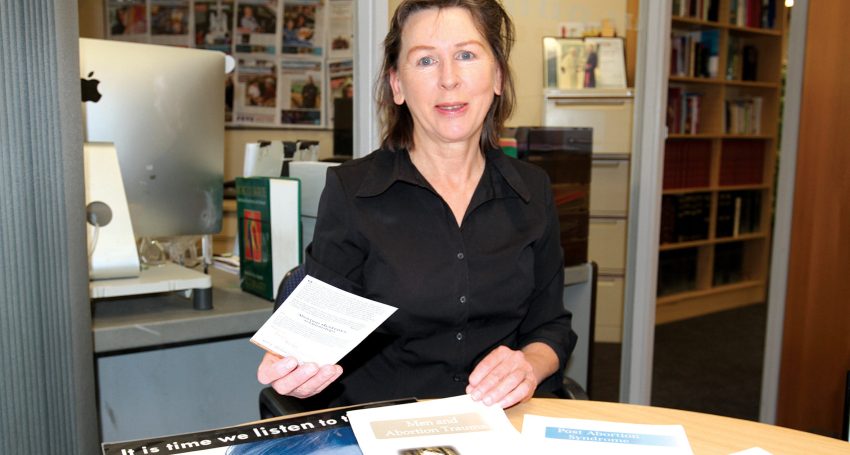Abortion grief a 'massive problem'
People
It’s a topic no-one seems to want to talk about, but abortion trauma is rife in our community according to Julie Cook, national director of Abortion Grief Australia.

As a mum of seven, Julie Cook knows only too well the strong bond between a mother and child.
That’s one of the reasons the former nurse and St Aloysius College old scholar became involved in counselling people suffering from abortion grief.
After her fourth child she began helping at a pregnancy crisis centre in Perth where there was “such an atmosphere of love and caring” that the women were willing to talk about how abortion had affected them.
Advertisement
“I started doing lots of research and I was stunned – reputable studies were showing 20 per cent full blown post-traumatic stress disorder within five or six years of abortion and half were having high stress reactions,” she said. “You could not have those figures without it showing in the community.”
Julie also heard “whisperings” from other health professionals at conferences that the symptoms of postnatal depression were the same as post abortion trauma, with the arrival of the baby triggering it.
“One of the problems is that people who care for women with postnatal depression work alongside people who provide abortions,” she said. “So it becomes very difficult to identify abortion trauma among postnatal depression; even if a woman identifies it as the cause, it’s dismissed.”
Julie, who was in Adelaide to address Birthline Pregnancy Support counsellors, has had a 25-year involvement with Abortion Grief Australia (AGA), a non-religious charitable organisation, providing a national crisis line and professional development.
She said major research published in The British Journal of Psychiatry (2011) encompassing nearly 1 million women found 10 per cent of mental illness in women was attributed to abortion.
“We now have a massive mental health problem that is not being addressed appropriately,” she said.
“Abortion trauma is creating an underclass of dysfunctional mothers struggling to raise children in a society that has little patience or sympathy for their plight.
“Untreated, abortion trauma has a tendency to be trans-generational. Politically powerless and isolated these mothers have little hope of accessing the recognition, support or the professional help they need.”
While having children heightened her empathy for women experiencing abortion grief, Julie’s concerns go back further to when she was training to be a nurse in Adelaide in 1978 and “this beautiful young girl committed suicide” after having an abortion. No-one recognised the symptoms and intervened.
On moving to Perth she heard of another woman who had given birth to a child after an abortion and tried to commit suicide but suffered permanent brain damage.
Advertisement
“I thought, how come I’m the only one hearing this, why aren’t we talking about it, this is a dreadful outcome,” she said.
“But doctors say it’s professional suicide to talk about abortion trauma because the medical literature has been inundated with studies saying there’s no such thing.
“If you’re a doctor you’re seen as unbalanced if you talk about adverse abortion effects.”
Women who have had abortions, said Julie, tend to think of themselves as victims and desperately need people to listen to them.
“I’ve had people so traumatised by their counsellors not addressing their abortion grief that they couldn’t even pick up the phone to seek help anymore,” she said.
“The trauma of the denial undermines their whole sense of self.”
Julie said she has never seen anyone heal without addressing three wounds: “Firstly, the loss of the baby…as a parent I really identify with that, I can relate to it, motherhood is a very, very powerful bond. Secondly, there is a loss of self-identity, they say you can never go back and be the same person you were before the abortion. Thirdly there is the spiritual wound.”
She stressed that it was never a counsellor’s role to bring up God but rather to listen and be there to give hope. The Church had a role to play in promoting awareness of abortion trauma, and the impact of abortion on not only the unborn but women and men.
“Catholics bring more to the table than they realise,” she said.
“And it has to be done as an action such as having prayers of the faithful in Mass for these mothers and fathers or public activities to show that the Church cares about women and men who are wounded.
“These people are in your church, she might be a good Catholic mum with five kids, you can never assume that someone hasn’t had an abortion.”
With a fifth of callers to its helpline male, AGA has received a mental health grant to address the issue of men and abortion trauma. Julie told of a 16-year-old boy who dropped out of school and was rescued from suiciding after his girlfriend had an abortion.
A South Australian man called the helpline and asked what happened in an abortion and when she asked if his wife had aborted, he broke down and told her that she had done so at 21 weeks after talking to their daughter and his best friend’s wife but not to him.
She said men were less likely to express their feelings than women but given the opportunity and permission to share and examine their own role in abortion, but were often very honest and direct and could work through their grief.
Talking about the gender of the baby and whether he or she had a name was often an important step in trauma prevention and healing because it “humanised” the relationship.
Julie said pre-abortion counselling wasn’t designed to allow couples to discuss the decision first, and GPs were shirking their responsibility by not fully informing patients of the risks before referring them to abortion clinics.
More information:
www.abortiongrief.asn.au
Helpline: 1300 363 550
Birthline: 1300 655 156








Comments
Show comments Hide comments